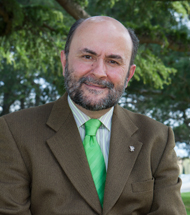"Europe is the safest place in the world at subject food."
The II Albareda Lecture of the Chair Timac Agro-University of Navarra was given at position by the expert in Food Safety and Oenology Alfonso V. Carrascosa

PHOTO: Manuel Castells
In the opinion of CSIC Food Safety expert Alfonso V. Carrascosa, Europe is the safest place in the world in food subject : "That is why cases such as the recent one involving adulterated meat in Brazil are in the news, because of their leave frequency. Moreover, these adulterations do not necessarily pose a health risk. What does happen is that they generate large economic losses and, for this very reason, they are reported and accountability is demanded".
This was explained today by the author of "The microbes we eat" on the occasion of the II Albareda Lecture, promoted by the Chair Timac Agro-University of Navarra, with the goal to bring young researchers closer to leading scientists at national and international level.
Carrascosa, director of the group of Microbiology and Biocatalysis of Food of the high school of research of Food Sciences of the CSIC, in Madrid, added that the way to avoid problems of consumption of food in poor condition "is to always buy them in controlled and approved establishments -which in our country are all-, take care of hygiene at home and strictly respect the expiration dates indicated by the manufacturers".
Regarding the possible higher incidence of food allergies and intolerances, the specialist argued that such problems have always existed, "but now they are better diagnosed and, in addition, those who suffer from them can cope with them thanks, among other things, to the high level of the Spanish food industry, capable of preparing quality foods specifically for special diets".
Yeast to "save" wine from climate changeAlfonso V. Carrascosa is also an expert in oenology and has collaborated as such in several CSIC projects on the use of selected and improved oenological yeasts to obtain quality wines. "Components such as mannoproteins or yeast walls can act as stabilizers against turbidity and foaminess and thus improve the quality of the wines". "In the CSIC, in addition," continues the guest speaker at the II Albareda Lessons, "strategies are being developed for the production of wines with low alcohol content that maintain their attributes, which would greatly expand the wine market".
Likewise, the lines of research that exist in Spain to face climate change -with new cultivation techniques or the use of microbes to control the fermentation of wines- augur a secure future for the wine sector despite the uncertainty of the climate: "This phenomenon is advancing, but so are the numerous research projects that are being developed in centers throughout Spain", as is the case of the group of vine and climate change of the School of Sciences of the University of Navarra.
Carrascosa, author among others of the book "Molecular wine Microbiology", is co-author of several patents transferred to companies and more than a hundred scientific articles in journals. award Candia and Gold Medal of Merit of the Oenological research in 2007, he also received the award of the Royal Galician Academy of Sciences 2009 and the award International Oenology OIV in 2011. He currently directs the prestigious scientific journal Arbor.





